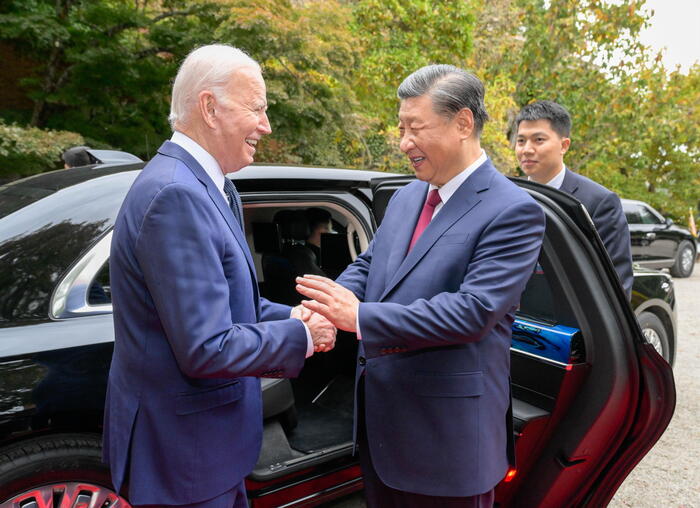In the rivalry with the US, Xi Jinping relies on innovation and a strong military: security and stability are prerequisites for development.
His new head of government is rather forgiving
Beijing/Munich – The Great Wall is a popular metaphor in China.
Today, Monday, it was used by head of state and party leader Xi Jinping himself.
In his speech at the end of the National People's Congress, Xi announced that he wants to expand the military into a "Great Wall of Steel".
Shortly before, the almost 3,000 delegates had, as expected, approved the announced increase in the defense budget by 7.2 percent.
Political Beijing is increasingly under the impression of growing tensions between China and the United States.
However, this time Xi refrained from a verbal confrontation on the big stage.
He did not address Washington's increasing sanctions against his country, for example on chips and other technologies.
Instead, he made a general plea for promoting innovation and "scientific and technological self-reliance."
Just a few days ago, Xi had made it unusually clear during the conference: "Western countries in particular, led by the USA, are pursuing comprehensive containment, encirclement and suppression of China." This brings with it "unprecedented, serious challenges for China's development “.
This time, in the face of "uncertain times," he called for heightened security awareness: "Security is the foundation of development, and stability is the precondition for prosperity." For years, Xi has gradually integrated state security into virtually every policy area, including the economy.
Li Qiang: pragmatic Xi loyalist is new premier
Xi secured a historic third term in office late last week and is at the zenith of his power.
Already at the party congress in October he had surrounded himself with favorites at the top of the communists.
At the People's Congress, he also rebuilt the government team - the so-called State Council - in his spirit.
With immediate effect, the government is leading the government as prime minister, Li Qiang, a long-time Xi loyalist.
At an earlier stage in his career, Li had served as the current president's chief of staff;
since then both have been closely connected.
The prime minister is traditionally responsible for economic policy, and in this area Li Qiang is seen as open and pragmatic.
That was confirmed by his first carefully orchestrated press conference on Monday.
China's reforms and opening-up have enabled the country's development, Li Qiang stressed there.
That had an impact on the whole world.
Most foreign companies are optimistic about China's prospects, Li said, pledging, "Regardless of external changes, we will unwaveringly continue our opening-up policy." He has worked in regions with thriving private industries for a long time, so he is well informed about the problems in the sector informed, explained the prime minister, who himself hails from Zhejiang - the coastal province with the largest proportion of private companies.
Discussions and rumors that Beijing does not support private entrepreneurs are "inappropriate".
Li Qiang focuses on economic development
As for the economy, Li faces a difficult task.
This year, the economy will have to struggle to recover from the consequences of the zero-Covid policy and the energy crisis that is also being felt in China.
It will not be easy to achieve the planned "around five percent growth", Li emphasized. The prospects for the global economy are difficult.
"Stabilizing economic growth is a challenging task, not only for China, but for all countries in the world."
China's head of state and party leader: This is how Xi Jinping rose to become the most powerful man in the world
China's head of state and party leader: This is how Xi Jinping rose to become the most powerful man in the world
Looking at the tense relations with the USA, the new prime minister struck a rather conciliatory tone.
The two largest economies are closely linked, from which both benefit.
"China and the US can and must work together," Li said. The idea of "decoupling" is just hype.
Xi Jinping: ruler for life?
The 63-year-old Li Qiang will now rule for at least five years.
His boss Xi Jinping, on the other hand, could stay in office for life if he wants to, thanks to a constitutional amendment he pushed through in 2018.
In doing so, he ties in with the founder of the state, Mao Zedong.
However, the chaos and power struggles into which Mao had plunged the country in his later years were actually the reason for limiting the terms of office of the heads of state and party to ten years.
Xi is now entering his 11th year as president.
The Mao era is highlighting the dangers of "an over-concentration of power in a communist political system," said Susan Shirk, University of California China professor and former department head at the US State Department.
"When no one dares to question the leader's decisions, the leader tends to make mistakes -- not just small mistakes, but those that put an entire society at risk." Xi has been in charge of all politics for the past few years China's subordinate to its ideological goals and the zero-Covid policy it has pushed.
Beijing only lifted the corona measures in December.
The world public will therefore pay close attention to whether Li Qiang's government will occasionally allow itself to object.
(ck/dpa)












